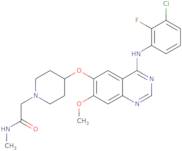2-(4-(4-(3-chloro-2-fluorophenylamino)-7-methoxyquinazolin-6-yloxy)piperidin-1-yl)-N-methylacetamidef
CAS: 848942-61-0
Rif. 3D-FC43349
| 1mg | Fuori produzione | ||
| 2mg | Fuori produzione | ||
| 5mg | Fuori produzione | ||
| 10mg | Fuori produzione | ||
| 25mg | Fuori produzione |
Informazioni sul prodotto
- 1-Piperidineacetamide, 4-[[4-[(3-chloro-2-fluorophenyl)amino]-7-methoxy-6-quinazolinyl]oxy]-N-methyl-
- 2-[4-[4-(3-Chloro-2-fluoroanilino)-7-methoxyquinazolin-6-yl]oxypiperidin-1-yl]-N-methylacetamide
- 4-(3-Chloro-2-fluoroanilino)-7-methoxy-6-[[1-(N-methylcarbamoylmethyl)piperidin-4-yl]oxy]quinazoline
- 4-[[4-[(3-Chloro-2-fluorophenyl)amino]-7-methoxy-6-quinazolinyl]oxy]-N-methyl-1-piperidineacetamide
- Azd-8931
- Azd8931
- Sapatinib
- Sapitinib
2-(4-(4-(3-Chloro-2-fluorophenylamino)-7-methoxyquinazolin-6-yloxy)piperidin-1-yl)-N-methylacetamide (F) is a reactive compound that has been shown to have anticancer activity. It inhibits the growth of cancer cells in cell culture by targeting the epidermal growth factor receptor and suppressing the expression of suppressor genes. This agent also induces apoptosis in squamous carcinoma cells and has been used as a model system for this type of cancer.
br>br>F has been shown to inhibit the proliferation of t47d cells, which are a type of human cervical cancer cells, by targeting the epidermal growth factor receptor and suppressing the expression of its downstream target gene, cyclin D1. F also suppresses activation of NFκB, which is a protein that regulates inflammation and cell survival, leading to increased cancer cell





